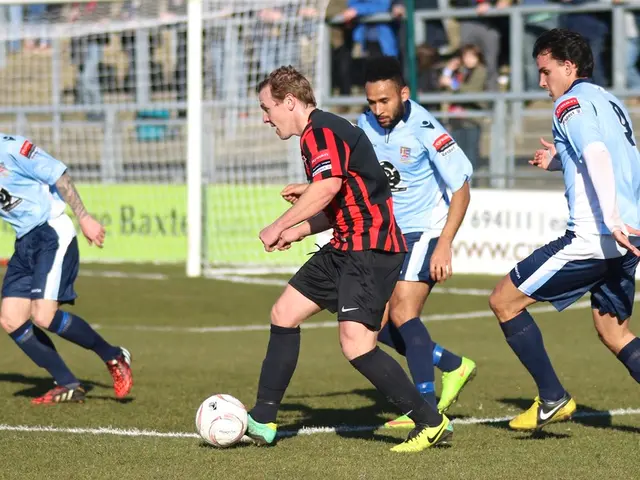Unusual Legal Strategies Employed in Notable Trials
In the courtroom, tales of drama, doubt, and unexpected twists unfold. As a legal aficionado, I've immersed myself in the complexities of landmark trials and the peculiar defenses conceived to shield clients from prosecution. Some of these defenses stretch the boundaries of reason, challenging our notions of justice, morality, and human behavior. Experiences like the defendant guilt-tripping his feline accomplice for a burglary or claiming that "too good looks" saved him from a murder conviction, are just a few examples of the lengths attorneys will go to defend their clients.
This examination of peculiar defenses sheds light on the unpredictability and intricacies of human behavior. I vividly recall the John Hinckley Jr. case, when he targeted President Ronald Reagan in 1981, inspired by the film "Taxi Driver." In this infamous trial, Hinckley's defense rested on an insanity plea, claiming that he was in the grips of a delusion, believing he needed to impress actress Jodie Foster. This audacious defense startled the nation, stirring a wave of debate about the legal standards for insanity and the ethical ramifications of such strategies. As we delve into these eccentric legal defenses, we uncover the ways they mirror broader societal issues and the intricate dance between law and human nature.
Stepping into the world of the courtroom feels like being in a hub where narratives are amplified, and life often appears larger than reality. As I unfold these peculiar defenses, I find that they not only provoke our imaginations but also provide us with invaluable lessons about the law, human psychology, and the imperfect nature of the justice system. Let's embark on this adventure together, exploring some of the most intriguing and thought-provoking legal arguments ever presented in court.
The Insanity Plea: Walking the Fine Line Between Madness and Manipulation
The insanity defense has long captivated legal scholars and the public, raising the question: How do we draw the line between sanity and insanity? This defense has been weaved into some of history's most notorious cases, sparking reflection on the morality of absolving horrific acts due to mental illness.
The John Hinckley Jr. Saga
Y'all Might Also Like
Weirdest Lawsuits Ever Filed – And What Happened NextCan You Get Away with a Crime Using the 'Sleepwalking Defense'?Most Credible Cases of People Who Vanished Without a TraceWhat Would Happen If Everyone Stopped Lying for a Day?
In March 1981, Hinckley wounded President Reagan, asserting that he was under the influence of a severe mental illness that rendered him imperceivable of the crime's unrighteousness.
READ ALSO What Chances do I have in a Lawsuit?
The trial captured the nation's attention, focusing minds on difficult queries about mental health, responsibility, and the criminal justice system's encounter with such challenges. Hinckley's acquittal based on insanity triggered strong backlash, inciting many states to reassess their laws concerning the insanity defense. This instance serves as a reminder of the nuances involved in adjudicating mental competency and the continuous dilemmas the legal system faces when grappling with these difficult concerns.
The Role of Mental Health Experts
In numerous insanity cases, mental health experts play a pivotal role in assessing the defendant's mental state. These specialists may provide testimony regarding the defendant's history of mental health issues and their mental state during the criminal act. These evaluations can be highly subjective, often leading to divergent viewpoints among experts.
As I’ve discovered in various trials, the credibility of mental health professionals can significantly impact the case's trajectory. In some instances, the jury might heavily rely on the testimony of these experts to comprehend the intricacies of the defendant's mental condition. However, this also elevates ethical concerns about the potential manipulation of the justice system. Are some defendants utilizing the insanity plea as a loophole to escape punishment for their actions?
The Twinkie Defense: A Twisted Justification for Murder?
Another baffling legal strategy that intrigues us is the supposed "Twinkie Defense." This term originated from Dan White's trial in 1978, after he fatally shot two city officials, Mayor George Moscone, and Supervisor Harvey Milk.
The Trial of the Twinkie Defense
White's defense team argued that he suffered from diminished capacity due to a mental disorder worsened by his consumption of junk food, particularly Twinkies. While the name "Twinkie Defense" may seem frivolous, it raises vital questions about the connection between mental illness, lifestyle choices, and criminal accountability. The jury eventually convicted White of manslaughter, rather than first-degree murder, sparking outrage nationwide.
What makes the Twinkie Defense so compelling is its reflection of societal attitudes about mental health and personal responsibility. Many argue that it trivialized the depth of mental illness concerns, whilst others propose that it served as an evocative reminder of the societal pressures that push individuals to commit desperate acts.
Food as a Defense: A Closer Look at the Psychological Aspect
The use of food as a legal defense might seem far-fetched, but it touches upon deeper psychological issues related to mental health, habits, and self-control. Some legal experts propose that food-related defenses may represent a broader societal trend toward understanding how our lifestyle decisions impact our mental wellbeing.
Although the Twinkie Defense gained notoriety, it opened the door for conversations about the impact of nutrition on our mental state. Legal experts and psychologists alike continue to collaborate on this connection, considering how social norms and expectations shape the way we perceive personal accountability in court.
Self-Defense: The Blurred Gray Area of Justification
Self-defense is another thought-provoking legal concept, but it can result in peculiar defenses when applied in unexpected ways. Through my research, I've encountered numerous cases where defendants claimed self-defense, even in situations that seemed to stray far from traditional self-preservation.
The Advent of Stand Your Ground Laws
One of the most significant developments in self-defense law recently has been the proliferation of "Stand Your Ground" laws across the United States. These laws permit individuals to utilize lethal force in self-defense without a duty to retreat, even when they are in public places. While this may seem reasonable at a glance, it has resulted in controversial cases and legal battles.
Consider the case of George Zimmerman, who shot Trayvon Martin in 2012. Zimmerman argued self-defense, and the incident ignited a nationwide debate on race, gun control, and the boundaries of self-defense claims. Ultimately, the jury acquitted Zimmerman, raising questions about the implications of Stand Your Ground laws and their application in real-world situations.
Pushing the Limitations of Self-Defense
Self-defense claims can easily blur the borders between righteous action and aggression. In my research, I've come to understand the difficulty of convincing juries to determine the intent behind a defendant's actions. Was the defendant genuinely threatened, or did they overreact to what appeared to be a threat?
I've encountered cases where defendants have articulated self-defense claims in ways that border on the troubling, such as a man shooting an intruder while engaged in a burglary and claiming self-defense, despite his participation in the crime. These cases illustrate the complexities of self-defense and the ongoing debate over where to draw the line between protecting oneself and taking a life.
Unusual Legal Strategies: The "Panic Defense"
Another peculiar defense strategy that has emerged in modern times is the "panic defense." In this argument, defendants claim that they acted violently due to a sudden emotional or psychological disturbance.
The Panic Defense in Action
The Ethics of the Panic Defense
The panic defense raises substantial ethical concerns about the role of emotional turmoil in violent crimes. Can we justify extreme actions based on emotional duress? Critics argue that the panic defense might inadvertently excuse violent behavior and perpetuate harmful stereotypes about men and emotional regulation.
As I delved further into these cases, I found that the panic defense mirrors widespread societal issues surrounding mental health and emotional regulation. This legal strategy may compel us to confront uncomfortable truths about ourselves, such as our emotional responses to stress, and the potential consequences of our actions.
Conclusion
Through this investigation of peculiar legal defenses, it's evident that the courtroom serves as a platform where human behavior is scrutinized in a way that can be both engrossing and unsettling. The cases we've examined showcase the intricacies of law, morality, and psychology as they challenge our idea of justice.
While some of these defenses may seem absurd, they aid in highlighting the human condition and the complex web of factors that guide our decision-making. In a world where the frontier between right and wrong can blur, the legal system wrestles with these murky waters with deliberation and insight.
- The insanity defense, as seen in the John Hinckley Jr. case, continues to question the line between sanity and insanity, raising discussions about the morality of absolving horrific acts due to mental illness.
- The Twinkie Defense, a peculiar food-related argument, highlights the connection between mental illness, lifestyle choices, and criminal accountability, sparking debates about societal attitudes towards mental health and personal responsibility.
- Self-defense claims can be intriguing, as they often blur the borders between righteous action and aggression, such as the case of George Zimmerman, who shot Trayvon Martin, igniting a nationwide debate on race, gun control, and the boundaries of self-defense claims.
- In the realm of self-defense, defendants can employ unusual strategies like the "panic defense," where they claim violent actions were due to a sudden emotional or psychological disturbance, calling attention to ethical concerns surrounding emotional turmoil and violent crimes.








